

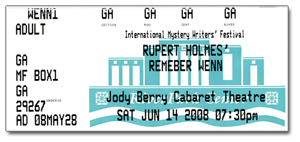
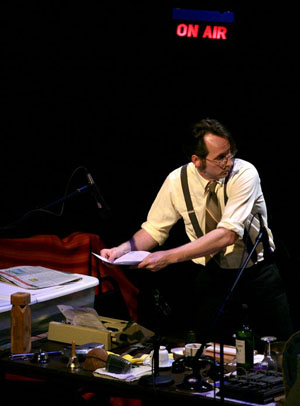
Just a few months short of the 10th Anniversary of the broadcast of the final new episode of Remember WENN, the International Mystery Writers’ Festival brought a fresh new performance of Remember WENN.
“The Ghost of WENN,” with its Tome of the Tomb Friday the 13th performance, was not part of the source material as expected (perhaps next year). Instead, the second prime source episode, in addition to “Armchair Detective,” was “On the Air.” “On the Air” was the premiere episode of Remember WENN and explains the arrival of Betty Roberts at radio station WENN and her quick ascension from unpaid intern to a salaried position. This is a better introduction for newcomers, particularly since the show has not been aired since the final reruns which ended in early 1999.
I’ll begin by setting the scene in the theatre. To the far left was the keyboard and its key tickler, Steve Amos. I haven’t said much about him. During the first WideScreen Audio Live! (WSAL) production I saw, I thought the music was coming from pre-recorded tracks that the foley artist controlled. It was only later that I spotted that the music wasn’t perfect because it was a recording, it was perfect because of a skilled keyboardist. Kudos to Mr. Amos.
I also noted, early in the WENN play, at a moment when no music accompaniment was needed, he seemed to be peering at amazement at the assembled throng’s tremulous excitement and enthusiastic response to the play. This was only the sixth WSAL production. Based on the other two I had attended, and the look on his face, I think WENN was receiving a substantially stronger reaction than any of the previous five WSALs. No doubt, WENNers numbered substantially among the audience and were expressing the emotional warmth and joy for an old friend welcomed back after a long absence. But I don’t think WENN initiates needed any extra encouragement to enjoy the experience. The scripts and performances were all that were needed.
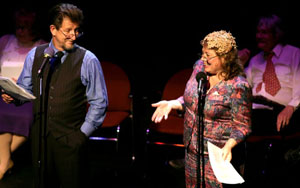
But I’ve digressed from my tour of the stage.
To the right of the keyboards, from the audience perspective, was the foley section with all manner of props. Directly above it was the “On Air” light.
Since Remember WENN features Mr. Foley producing the effects, the foley area became less of an area to support the “Armchair Detectives” play than where Mr. Foley supports the current WENN broadcast.
From this you can deduce that the stage area next to the foley was dedicated to representing Studio A, the primary broadcast studio.
The other half of the primary stage area represented other rooms at the station as needed.
Finally. the far right area represented Eugenia’s beloved organ (which knows “Chopsticks” by heart).
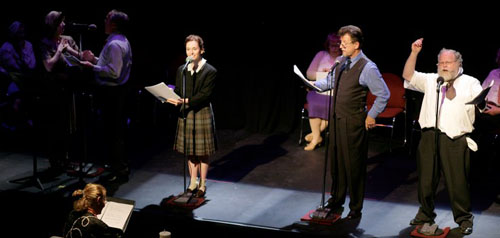
Naturally, you can spot the logistical problem here. This could put the green room, the writer’s room, the station manager’s office, or the lobby between the organ and the studio. However, Eugenia isn’t needed so much at the organ when the focus of “Armchair Detectives” isn’t on the studio. When the focus is on the studio, then the area of the stage used for the other rooms of the station becomes an extension of the studio and Eugenia Bremer is magically in the studio.
Having explained the solution to the WENN time/space continuum conundrum, let’s proceed to the cast. Here, I’m relying on the list printed in the “Live Theatre to Die For” insert in the 2008 CenterSTAGE RiverPark Center Magazine. Unfortunately, I know this list isn’t 100% correct. As “The Ghost of WENN” material had been planned, there was a role for C. J. McHugh, the station engineer. This role was dropped. Yet, it was still listed.
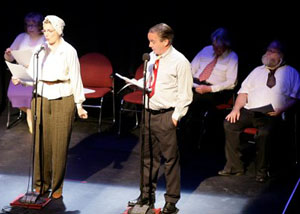
Even though I turned in my ballot and do not have it for reference, I remember clearly some of the errors on it. Errors on the ballot are more unfortunate than errors in the program’s cast list since it may have affected the tallying process. From memory, Gary Sandy was listed in the wrong role; which means the wrong actor was listed for Victor Comstock, as well. I hope they had the ballot correct for subsequent performances.
Amy Walker played Betty Roberts. I had high expectations of Amy after her performance in two other WSALs. Gary Sandy took the role of station manager Victor Comstock. Phil Proctor, after a lifetime in audio theater and working as a voice actor, was the logical choice for WENN’s “Man of a Thousand Voices,” Mackie Bloom. Phil’s wife, Melinda Peterson, portrayed Hilary Booth. Tom Luce played Mr. Hilary Booth, er, Jeff Singer. Deana Duncan, in a big blond wig, played bubbly Celia Mellon. Debra Babich operated the switchboard as Gertie Reece while Jenifer Elder operated the organ as Eugenia Bremer. Mark Sawyer-Dailey appeared as the soon-gone Mr. Gianetti. Dave Ossman stepped away from the director’s chair to inhabit the role of Mr. Eldridge. Clint Vaught was the escaped convict, Larry Looper.
The “Featured Cast” lists Richard Fish as “Mr. Foley.” However, the credits list Tony Brewer as performing the foley effects. And my rusty memory believes only one person did both the foley and the Mr. Foley role and I believe that was Tony Brewer.
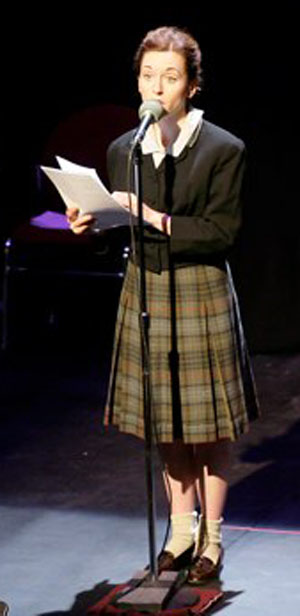
David Ossman’s wife, Judith Walcutt, produced and directed. And nameless technicians did wonderful things with the lights and audio.
Before I describe the show, I must state that, although I attempt to be objective, my perceptions where Remember WENN are concerned are uncertain. The actors here have the horrible tasks of taking over roles and scripts already performed and beloved. And yet, they must bring something of themselves to the roles to perform their craft. They may chose a different interpretation than the one I’ve seen on the show. And, being accustomed to how it was done on the show, I’m already predisposed to prefer the television show version if there is a difference in the performance. So, I reserve the right to fall flat on my face in my comments.
With caveat complete . . .
The play opens and Betty arrives at the station much as she did in the show. We get to see/hear quite a rich sampling of WENN’s radio programming pulled from various episodes of the show. While the broadcasts are continuing, Betty eventually meets everyone around the station, including the skirt-chasing Jeff Singer and his wife, Hilary Booth . . . of course.
Tom Luce’s Jeff appears closer in age to Melinda Peterson’s Hilary than Hugh O’Gorman’s Jeff does to Melinda Mullins’ Hilary. The Jeff/ Hilary relationship in the show is one of a May/August relationship. However, Armchair Detectives is a radio play (with a lot of radio plays within it). One of the points in audio drama’s favor is that you can play parts quite unlike yourself, such as Fanny Brice playing a character, Baby Snooks, 40 years younger than herself. So, despite Tom Luce’s apparent age, I still took Jeff to be youngish. However, I don’t recall the script playing up the age disparity of the characters. Audience members unfamiliar with the show probably assume they were of approximately the same age. Whatever the age difference between the characters, Hilary’s age seems to have advanced since “On the Air.” Jennifer Payne pointed out that Betty now gives a younger age for when she saw Hilary in The Rivals.
Before long, it’s time for the speech. “Unique?! It is inestimable!” The speech. The one I love. “I thought the hero looked just like me.” I can’t be objective about this speech. “And therein lies the magic.” More than anything else about the series, this was the scene that hooked me. “Tens of thousands of people out there, listening, each envisioning their own motion picture of the mind.” I saw Gary Sandy do great work in My Gal Sunday and Flemming. “And that is what we give our audience, Miss Roberts.” So I know he has the chops to put something into this speech. “We give them dreams. We give them towers and landscapes, secrets and revelations.” And yet. And yet. “We give them a warm hearth in the dark . . . or a cold shiver up their spine.” It sounded like he was just reading it off the page. “And we do it all here, live, on the sparest of threadbare budgets, with a troupe of actors who, underpaid and underrehearsed and overwhelmed, have yet to learn that this simply . . . cannot . . . be done.” And, well, that’s radio actors do; they read directly from scripts, don’t they? “Miss Roberts, you are standing in the wings of the most unbounded stage in creation.” But even “inestimable” sounded flat. “Say you’ll join our company.” I wanted to jump through the screen and say, “If she doesn’t want the non-paying intern job, I’ll take it.” I did not want to jump on this stage, though. Maybe the name mix up on the ballot meant that the roles kept being changed around and Sandy wasn’t always doing Victor . . . so he didn’t study the part. Or he didn’t see this speech as central to the show as I do. Or he couldn’t slow down the play to make room for a more studied pacing and emphasis. I think this scene states the core of the show and your Hilary/Jeff, Scott/Betty/Victor, etc., are all secondary. At the least, the speech is central to Victor’s character. Or . . . I’m a complete idiot. I did enjoy the rest of his performance and still gave him good marks on the ballot. But I really wanted this one knocked out of the RiverPark.
Soon, Mr. Gianetti is soused, and Betty faces up to the challenge. Here marks another slight difference that, after discussing it with others, may be just in my mind. In “On the Air,” when Betty has Mackie recite one of Shakespeare’s sonnets, Christopher Murney delivers a killer line reading. It seems to take Hilary’s (rather than Daphne’s) breath away (although she stays in character): “Well let’s have them all.” Phil Proctor’s reading is lighter on the gravitas (but not frivolous) and Hilary’s “let’s have them all” clearly means “fill up some air time” since they’ve run out of script. I miss the strong reading Murney gave the sonnet.
Why I’m probably wrong. In the episode, they had time for pauses and pacing and to do a slow tracking/zooming in on Mackie. With the speed the play was moving at, it might have lost momentum if it gave Mackie’s recital the time it would need for a solemn reading. Of course, playing it the way Murney did would have underpinned one of the main ideas of the play: that radio would allow Mackie Bloom to be a great Shakespearean actor because he didn’t have to fit some preconceived idea of what a Shakespearean actor should look like.
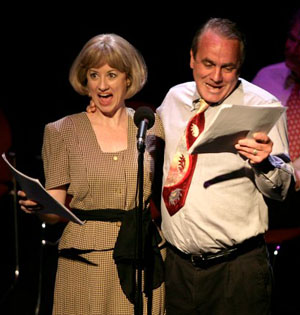
With Valiant Journey ended and Gianetti taken to the hospital, Victor makes the job offer as before. As a side note, Betty’s narration in the play reveals that Gianetti did recover, but did not return to the station. I forget what he did in later years. Something else I should mention about the staging. The audience had an omniscient-like view of the station. Although Betty and Victor might be in the station manager’s office on our right, the left side of the stage was still the studio where WENN was broadcasting. So while Betty and Victor hammered out her work details, we could observe Mackie and others radio-acting up a storm. You could tell the actors were having fun playing up to lines they were likely improvising. I think that feeling of fun was contagious and spilled into the audience. Toward the back, Jeff, Celia, and Mr. Foley were in a heated debate. And we know how yackety-yackety Mr. Foley can be. However, since the studio wasn’t the focus at the moment, the studio sound was muted. However, a coffee cup was being held up; long-time fans could guess what the argument was about.
Jeff and Celia came searching for Betty to get her opinion while Mr. Foley turned his back to them. Yes, they were debating the best way to represent the sound of a kiss. They proceeded to do a couple seconds of a most effective kiss which did have the sound of truth about it. Of course, you know the rest: Hilary walked in at that moment and words of bludgeoning and blunt ingenues followed. I believe in this exchange, Celia gives a different retort about the two els in “Mellon” other than a reference to the rich family (but I didn’t quite catch it).
But, soon, another crisis arises: Hilary is called upon to perform “I Gotta Sing.” As in “Behind Every Great Woman,” Betty pipes up and lets loose her pipes on the song. Amy has Betty just a tad uncertain at the beginning, but playing around with the song at the end.
Why it’s right. While it’s not a pure performance of the song, this is Betty’s first day; she’s not a seasoned pro, yet. So, to Betty, in the space of an hour, she’s come in off the street and is now singing out to the entire audience and starting to feel her oats. So her getting playful with the song at the end is the right choice.
While Amy Walker does a great job with the song, however, there’s just something about Amanda Naughton’s voice that makes Amanda’s version superior.
At this point, we slip into Betty’s narration. She explains that some time has passed since that first day. We leave her narration, and join Rance Shiloh. Just when they needed foley effects for a gunfight, Mr. Foley has been overtaken by sleep. So Jeff and Mackie come up with the “killing slap” to use in place of firearms.

We segue into the events from “Armchair Detective” at this point and it plays out pretty much as the episode did.
There was another bit like the one in Flemming where Phil Proctor says someone else’s lines. Unfortunately, where it was intentional in Flemming to cover another actor, here it was unintentional. He dealt with it by saying something like, “wrong line,” and dropping his script or something like that. They quickly moved on.
My initial reaction to Ossman’s Mr. Eldrige was that he was slightly too goofy. But then I realized was conceiving him as we knew him over 56 episodes. We saw him with a clear mind when he fooled them about the lottery ticket and befuddled when he got a ladder for a pregnant woman. You really couldn’t communicate his mental ebb and flow in one show without making him more the focus of show. And I think I was reacting more to the physicality David Ossman brought to the role (which wouldn’t be seen in an audio play).
Neither Eldridge nor Eugenia had a great deal to do. But Jenifer Elder’s Eugenia made the most of it. She got across Eugenia’s enthusiasm and eagerness . . . particularly when Eugenia had a meat cleaver in her hand. :)
At the end, characters begin filling in some of WENN’s future. In Jeff’s 10th year at WENN, a television was wheeled into the studio. Its unimpressive image didn’t give much of a hint that it would crush radio as they knew it. WENN’s run of original programming of drama, comedy, and the oh-so-many kinds of scripts Betty would write, would only last 20 years. No more Shakespeare for Mackie, only a clown on a kid’s show. The former Broadway star Hilary would end up best remembered for playing Beaver’s grandmother. (I immediately thought of Agnes Moorehead as Endora on Bewitched.) These revelations segued into the “radio makes us family” segment from “Christmas in the Airwaves.”
The play ended with Betty singing the theme song. All those dreams radio put into our head, the towers and the landscapes, the secrets and revelations, the shivers up our spines, and the friendly, familiar voices. It’s all right there, in our heads. All we have to do is reach back into our memories . . . reach . . . reach . . . and remember when...
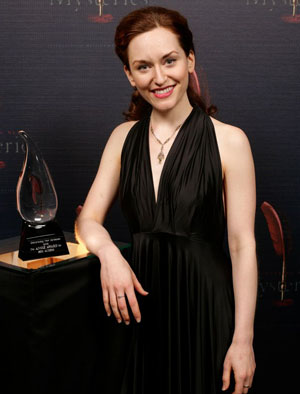
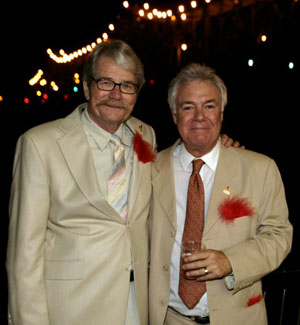
Congratulations to Amy Walker for receiving the 2008 Angie Award for the category of Live Radio Theatre — Best Actress — Betty Roberts — Remember WENN. Amy also took the Best Supporting Actress award for Live Radio Theatre.
Congratulations to David Ossman, who also won two Angies this year. In addition to his Best Director award for Live Radio Theater, he won in the category of Live Radio Theatre — Best Supporting Actor — Mr. Eldridge — Remember WENN. David (L) is pictured with fellow Firesigner Phil Proctor (R), who provided Mackie Bloom's multiple voices in these performances.
Of course, camera use during the play is prohibited by law. The images above were taken by the Festival’s official photographer, Bryan Leazenby. For a much better look at images of the plays, visit the Festival's Photo Gallery. Bryan can be contacted at bryan@onsiteimages.biz for prints. I did and I’m quite pleased.